|
BIOGRAPHY
Steven Allan Spielberg
KBE
(born December
18, 1946)
is an Oscar
winning Jewish
American film
director and producer.
His German last name comes from the name of the Austrian
city where his Hungarian ancestors lived in 17th century: Spielberg.
He is noted in recent years for his willingness to tackle
emotionally powerful issues, such as the horrors of the
Holocaust in Schindler's
List, slavery in Amistad,
hardships of war in Saving
Private Ryan, and terrorism in Munich.
One consistent theme
in his family friendly work is a childlike, even naïve, sense
of wonderment and faith, as attested by works such as Close
Encounters of the Third Kind, E.T.
the Extra-Terrestrial, Hook
and A.I.,
and the challenging role of a father-figure.
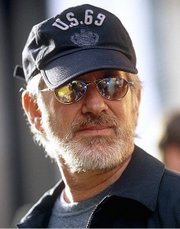
Steven
Spielberg
Arguably the most important figure to emerge from the
creative ferment of Hollywood cinema in the 1970s, Steven
Spielberg has changed the way movies are made and about what
they are made. He is perhaps the Western world's most famous
living filmmaker; three movies he directed ("E.T. the
Extra-Terrestrial" 1981; "Jurassic Park" 1993;
"Jaws" 1975) are among the top ten highest grossing
films of all time. His former production company, Amblin
Entertainment, was also responsible for such hits as
"Gremlins" (1984), "Back to the Future"
(1985) and "Who Framed Roger Rabbit" (1988). Spielberg
has succeeded in combining the intimacy of a personal vision
with the epic requirements of the modern commercial blockbuster,
but his astonishing success invalidated his acceptance as an
artist for many years. Marketplace issues aside, Spielberg
certainly travels in august creative company: like Orson Welles,
he has been celebrated and penalized for precocity; like Alfred
Hitchcock, he has been alternately praised and damned as a
master of emotional manipulation; and like Frank Capra, he has
been criticized for shameless sentimentality. Spielberg's most
important spiritual predecessor, however, is Walt Disney,
another creative individual who made himself into a brand name
while attending to the serious business of making
"frivolous" entertainments.
Several Spielberg films have become landmarks in the
development of special effects, both in their visual and aural
aspects. This filmmaker, however, is no technocrat nor does he
display a serious intellectual interest in science fiction.
Spielberg utilizes elements of sci-fi and fantasy but tends to
eschew heavy ideas in favor of sublime feelings, such as
childlike awe and trust. Indeed, his work has decisively
influenced the emphasis in late 20th Century sci-fi filmmaking
on the sensibility of youth and they succeed in spite of blatant
sentimentality through the director's masterful use of
emotionally potent visual imagery. If nothing else, Spielberg
possesses an uncanny knack for eliciting and manipulating
audience response.
Unlike many of his contemporaries, Spielberg did not attend a
major university film program. Largely self-taught, at age 16,
he fashioned his first film "Firelight", a two-hour
science fiction movie, that a local movie house in Phoenix, AZ,
consented to run for one evening. His short film, "Amblin'"
(1969) impressed executives at the television unit of Universal
Studios and Spielberg was hired, making his debut directing the
formidable Joan Crawford in the TV-movie pilot for Rod Serling's
"Night Gallery" (NBC, 1969). He went on to hone his
craft helming episodes of such weekly series as "Columbo"
and "Marcus Welby, M.D." as well as three TV-movies.
One telefilm, "Duel" (ABC, 1972), about a salesman
(Dennis Weaver) pursued by a giant diesel truck whose driver is
never seen, was released theatrically in Europe, where it
enjoyed both critical and commercial success.
Spielberg's first theatrical film, "The Sugarland
Express" (1974) was based on the true story of a lumpen
Texas woman and her escaped convict husband fighting to regain
custody of their baby. The film anticipates the emphasis on
family in Spielberg's subsequent work; his choreographed car
chases and deft handling of suspense and comedy marked him as a
director to watch. Poorly marketed, this entertaining and
poignant feature failed at the box office. Spielberg's second,
"Jaws", however, helped usher in the modern age of
movie blockbusters. This troubled production--a neophyte
director and a disgruntled crew with a malfunctioning automated
shark--emerged as a classic adventure yarn that propelled
Spielberg to the A-list of Hollywood directors.

ET
(extra terrestrial) and Steven
Spielberg
His transcendent follow-up, "Close Encounters of the
Third Kind" (1977), revealed the first flowering of his
cinematic interest in the world of childhood, an affinity shared
with the late Francois Truffaut, who played the head scientist
in the film. Though initially terrifying, the alien creatures in
this revisionist work resemble strange and wondrous children,
presenting a more benign representation than the monstrous
conquerors of 50s sci-fi films. These beings offer the promise
of life beyond the restrictions of middle-class conventions.
When Richard Dreyfuss boards the mother ship for unknown
adventures, it is the film's final grandiloquent embrace of the
possible.
Riding high after two back-to-back blockbusters, Spielberg
attempted a colossal big-budget comedy. "1941" (1979)
was a loud, sprawling and wildly uneven film about paranoia in a
small California town after the attack on Pearl Harbor. Though
it ultimately turned a profit, the film was perceived as a huge
and indulgent flop. Spielberg next chose to work under the
watchful eye of a tough producer, George Lucas, and fashioned
what would turn out to be one of his signature films,
"Raiders of the Lost Ark" (1981). The movie introduced
the world to Indiana Jones (played by Harrison Ford), the
celebrated archeologist and intrepid adventurer that became the
most popular screen hero since James Bond and spawned two
sequels. During the production, Spielberg was so wearied by the
rigors of location shooting that he would relax by concocting a
story for a little personal film to feature a couple of kids and
a lost alien. This set the stage for "E.T. The
Extra-Terrestrial"--the work for which Spielberg may well
be best remembered. An instant classic, this emotionally
overwhelming film transformed its maker's career.
In most Spielberg films, anything that threatens the family
and its routine existence is evil. In "Jaws", the
normally safe harbor of a public beach is threatened by a great
white shark. The heroes of "The Sugarland Express" and
the Indiana Jones trilogy are transported from normal life to a
world of exciting adventure though, in the former, the
consequences are tragic. As a young filmmaker, Spielberg seemed
to prefer the child's world of harmless adventure (c.f., "E.T.")
to the violence and hardships of the real world. Significantly,
Spielberg presented WWII through the eyes of a youthful
protagonist in "Empire of the Sun" (1987), a
transitional work, and he oversaw an Oedipal fantasy as the
producer of "Back to the Future", in which a son
remakes his parents from nerds into successful yuppies.
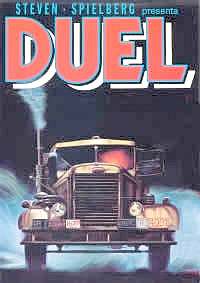
The Lucas collaborations--"Indiana Jones and the Temple
of Doom" (1984), in particular--have aspects that some find
embarrassingly racist, imperialist, and misogynistic. Even his
affecting adaptation of Alice Walker's novel "The Color
Purple" (1985), although dealing with racism, wife-beating
and lesbianism, recreates the air of an old-fashioned Disney
film. That Spielberg co-produced and co-wrote
"Poltergeist" (1982) and took over directing the film
when Tobe Hooper was incapacitated is significant, for it
presents the dark underside of suburbia that is only hinted at
in his own films.
There was a marked shift in Spielberg's artistic and
commercial concerns beginning in the mid-80s, as he began
devoting more time to producing. With the notable exception of
the continuing Indiana Jones franchise, the projects he chose to
direct were departures from his usual material. After "The
Color Purple" and "Empire of the Sun", he
directed Always" (1989), his first romantic feature in
which he also dealt with issues of emotional commitment, loss,
and mortality. Even "Indiana Jones and the Last
Crusade" (1989) broke new ground, shifting the locale to
Europe and the emphasis to Jones' family dynamics. While the
action sequences were largely uninspired, the spiky father-son
banter between Harrison Ford and Sean Connery was the film's
highlight.
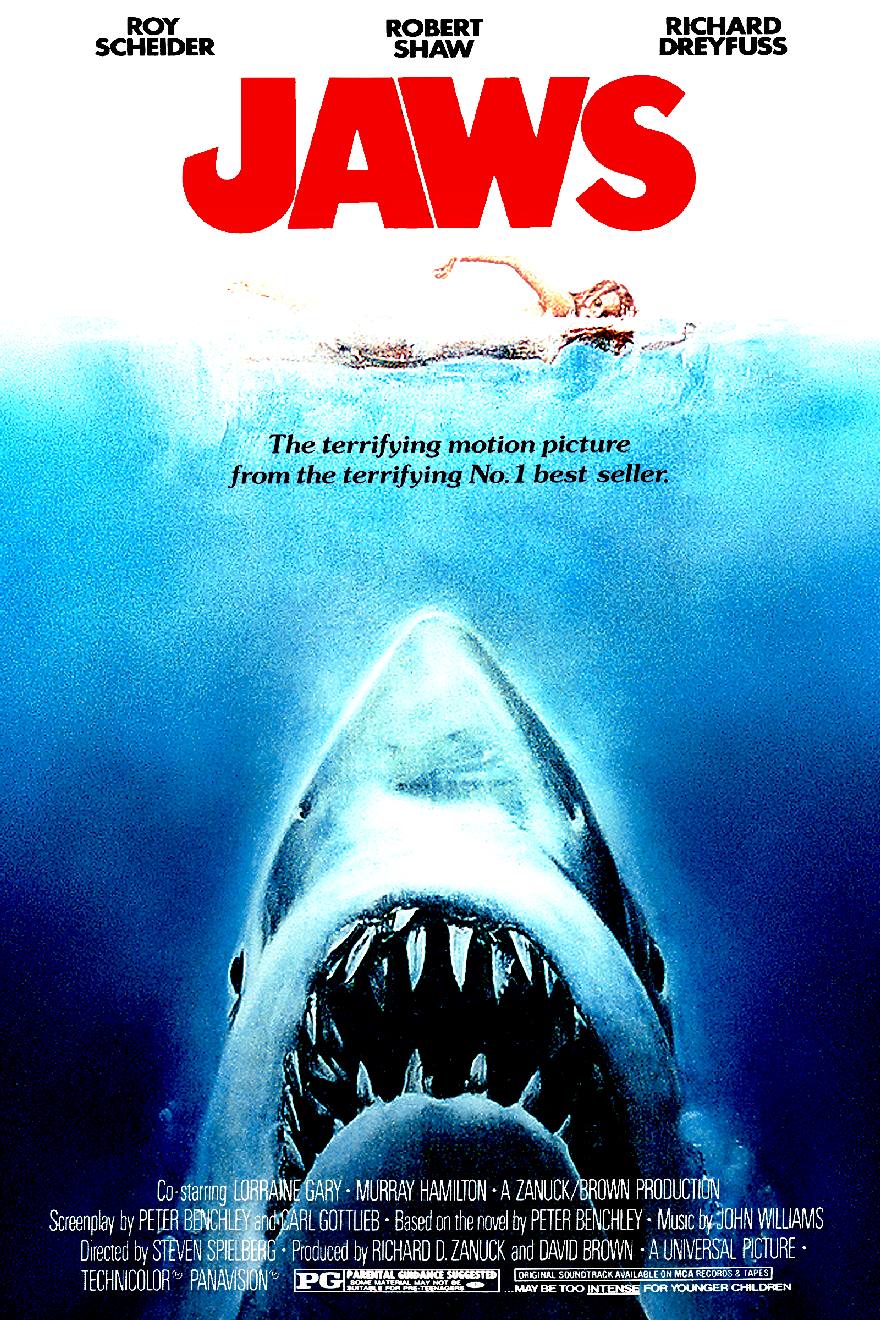
Steven
Spielberg cut his teeth on the meaty role Jaws presented, directing a
film using a giant rubber shark model, that simply would not work. Oddly
enough, having to resort to Alfred Hitchcock like suspense building, in not
showing 'Bruce,' as the flawed animatronic became known, the lack of props
actually helped to make the film a success.
Through
Amblin, Spielberg continued to oversee the production
of a series of popular escapist fantasies, animated features and
conventional genre films into the 90s. He even diversified into
TV with the fantasy anthology series, "Amazing
Stories" (NBC, 1985-87), which he executive produced and
provided with many of its stories. Though lavishly produced and
often dealing with Spielberg's characteristic themes, too many
of the episodes were slight and unsatisfying, although at least
one, "Family Dog," an animated outing with director
Tim Burton, was spun off into its own 1993 series . He achieved
far greater success with such children's animated series as
"Tiny Toon Adventures" (syndicated, 1990-95) which
attempted to resurrect the style and sensibility of classic
Warner Brothers animation, the knowingly retro "Steven
Spielberg Presents Animaniacs" (Fox, 1993-95; The WB,
1995-1998 ) and its spin-off "Steven Spielberg Presents
Pinky and the Brain" (The WB, 1995-1998); along with "Freakazoid"
(1995-1997) and the short-lived "Toonsylvania" (1998).
Spielberg's involvement with high-quality retro animation
stemmed back to his stint producing the 1988 film "Who
Framed Roger Rabbit?" which pioneered effects techonology
that allowed live action characters to interact with animated
chreations.
On the big screen, "Hook" (1991) was Spielberg's
long-awaited return to fantasy material. A lavish yet quirky
update of the Peter Pan story, the film displayed its maker's
increased concern with the responsibilities of parenting, the
therapeutic aspects of regression and preparing for death.
Budgeted at over $60 million, the film garnered mixed reviews
and decently impressive box office but--due to an unprecedented
deal brokered by Creative Artists Agency wherein Spielberg and
his stars, Dustin Hoffman, Robin Williams, and Julia Roberts
split a huge cut of worldwide revenues up front--failed to make
much money for its studio.
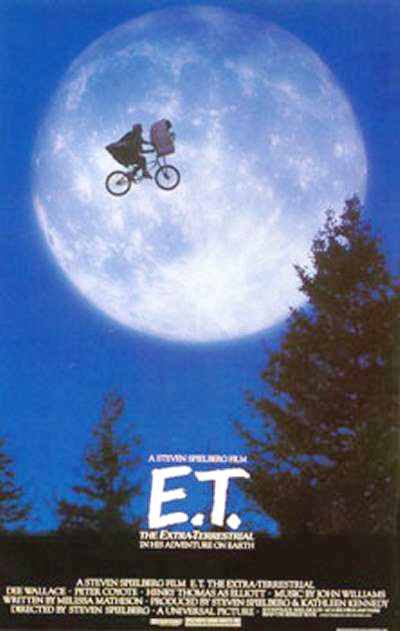
The Spielberg of the 90s again made directing a top priority,
lending his name to various Amblin products while leaving
producing chores to others. "Jurassic Park", a $70
million adaptation of Michael Crichton's dinosaur disaster
novel, represented a return to the kind of muscular adventure
that served Spielberg so well in the past. The film was a
special effects breakthrough and boasted awesome action
sequences though the characters were unusually shallow.
Intriguingly, Spielberg did relatively little publicity for one
of the most aggressively marketed films in history. He had
juggled post-production work on "Jurassic Park" in
Paris--with George Lucas reportedly lending a hand stateside -
with filming his long-awaited WWII Holocaust drama,
"Schindler's List" (1993) in Poland.
Filmed in black-and-white, without big stars and few slick
stylistics, this bleak version of Thomas Keneally's Booker
Prize-winning novel (based on a true story) marked a dramatic
change-of-pace for this purveyor of warm WASP visions. For once,
he went against his instincts and made an impressively
restrained, documentarian drama of Jewish suffering that built
to a shattering yet life-affirming conclusion. The resulting
film earned Spielberg the most respectful notices of his career.
Spielberg was now widely hailed as one of the masters of world
cinema. (That the film, which earned seven Oscars including Best
Picture and Best Director, also grossed over $100 million
domestically didn't hurt either.)
As an encore, he returned to familiar ground with the
inevitable sequel "The Lost World: Jurassic Park"
(1997) which merely rehashed the story of the far superior
original. Spielberg then tackled the tricky historical drama
"Amistad" (also 1997), based on a true story of a
mutiny on a slave ship that spawned a legal battle in the USA.
Meticulously staged, the film was noted for its depiction of the
Middle Passage, a harrowing portrayal of the conditions of
slavery. The following year, Spielberg returned to WWII for one
of his most acclaimed films, "Saving Private Ryan". A
nearly three-hour fictionalized look at a unit sent to locate
the sole survivor of four brothers serving in the military. the
film earned praise for its no-holds-barred depiction of the
battlefield, although the characters bordered on cliche. Critics
anointed the picture one of the year's best on its release in
July and it subsequently earned over $200 million at the box
office and received 11 Academy Award nominations. Although
favored to take home the Best Picture award, it didn't, but
Spielberg was crowned with a Best Director statue.
In the fall of 1994, Spielberg, recording mogul David Geffen
and former Disney production head Jeffrey Katzenberg formed a
new multimedia entertainment company, christened DreamWorks SKG,
which would produce live-action and animated features, TV
programs, recordings and interactive computer software in a
relatively cost efficient manner. According to Spielberg,
DreamWorks would grant its filmmakers "moral rights"
to protect the original versions of their films after release.
The studio also decided to give its animators and screenwriters
contracts that guarantee them a share of a given film's success
in defiance of the standard creative bookkeeping for the
industry.
Spielberg was to oversee the design of the studio's
planned physical plant, laid out like a college campus on the
old Howard Hughes aircraft site near the wetlands of Playa
Vista, California--however, after much back-and-forth the Playa
Vista plan was scrapped and DreamWorks ended up being housed on
the Universal lot, co-existing with Spielberg's Amblin
Entertainment facilities. The game plan was that Spielberg would
oversee the production of live-action features, Katzenberg would
direct the state-of-the-art animation division, and Geffen would
head SKG's independent recording label.
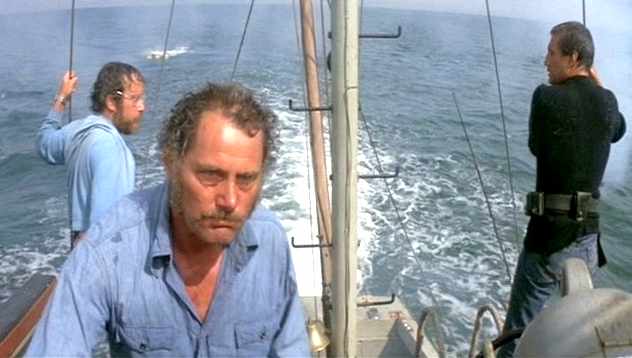
Jaws
- Captain Quint draws the shark
The fledgling studio's first small screen efforts met with
limited success; only the Michael J Fox vehicle "Spin
City" (ABC, 1996- ) was a hit. Other efforts like
"Champs" (ABC, 1996), a male-bonding comedy, and the
overly-familiar police drama "High Incident" (ABC,
1996-97) came and went quickly. Even DreamWorks' first major
feature "The Peacemaker" (1997), a nuclear war
thriller, enjoyed only a modest box office, but the studio
eventually came into its own with hits such as "Saving
Private Ryan," "Shrek," "The Ring,"
"Gladiator," "Galaxy Quest," "American
Beauty," "A Beautiful Mind," "Meet the
Parents" and "Minority Report," which company
produced and/or co-produced with other studios.
Spielberg was also not without success on
televison, being
one of the executive producer of the long-running smash hit
medical drama "ER" (1994- ) created by Chrichton, and
the hugely-rated Sci-Fi channel miniseries "Taken"
(2002) and the similarly popular Western-oriented TNT mini
"Into the West" (2005). His most impressive
accomplishment on the small screen was the HBO mini-series
"Band of Brothers" (2001), based on historian Stephen
Ambrose's book about Easy Company, the 506th Regiment of the
101st Airborne Division, U.S. Army. Spielberg produced the
powerful 10-episode series with Tom Hanks, and "band of
Brothers" earned a multitude of Emmys along with critical
and popular acclaim.
But moviemaking with himself behind the camera remained the
director's primary passion, and he continued to explore the
boundaries of his talents within a commercial context.
Although
he was unable to fully integrate his own crowd-pleasing
filmmaking sensibilities with the more bleak and philosophical
viewpoint of one of his idol, director Stanley Kubrick, when he
elected to make "A.I. Artificial Intellegence" (2001),
a Pinocchio-like sci-fi fable Kubrick had mused over for over a
decade, the film was a noble failure, with several arresting
moments, eye-popping visuals and fine performances from Haley
Joel Osment and Jude Law. But Spielberg returned to top
blockbuster form when he adapted Phillip K. Dick's sci-fi
novella "Minority Report" (2002) and tapped Tom
Cruise, one of the biggest movie stars on the planet at the
time, to star. A fast-paced, intense and compelling thriller,
"Minority Report" was Spielberg's leanest and meanest
film in years, despite its abundant sci-fi trappings, and showed
that the director still stood head-and-shoulders above the new
wave of video-game style directors of similar action-adventure
fare. The director followed that artistic and commercial triumph
with yet another impressive achievement that same year, helming
"Catch Me If You Can," the true-life story of con man
Frank Abagnale, Jr. (Leonardo DiCaprio), the youngest person
ever to make the FBI's Most Wanted list. Not only did Spielberg
flawlessly recreate-on both a realistic and nostalgic level-the
1960s setting and coax DiCaprio's most charming and mature
performance to date, he cannily cast his close collaborator
Hanks against type as the downtrodden, schleppy FBI agent who
doggedly pursues the con artist.
The director re-teamed with Hanks a third time for a
seemingly unlikely project, "The Terminal" (2004), in
which Hanks plays an Eastern European immigrant who, due to a
political regime change and passport snafu, is forced to reside
in a New York City airport terminal until his documentation
glitch is resolved. Although the film had its share of wonderful
moments, overall it was one of the director's more
artificial-feeling efforts. Much more effective was Spielberg's
riveting remake of the H.G. Wells sci-fi classic "War of
the Worlds" (2005), adding a contemporary spin on the
familiar tale while also culling inspiration from some of the
best elements of earlier incarnations, including Wells' novel,
Orson Welles' radio broadcast and the 1950s film version, bouyed
by a spectacular array of special effects. The director
re-teamed with Tom Cruise, casting the actor as a working class
deadbeat dad who must step up and protect his two children
during a horrific alien invasion (The film was nearly
overwhelmed by the controversial morass of publicity that
surrounded the seemingly erratic behavior of Cruise in the weeks
prior to the release).
Spielberg's success has allowed him to pursue numerous
philanthropic and cultural pursuits. He refused to accept any
earnings from "Schindler's List" calling it
"blood money". He channeled those millions into the
Righteous Persons Foundation, which has granted money to a range
of projects that impact on modern Jewish life. He also served as
chairman for the Survivors of the Shoah Visual History
Foundation, an ambitious project devoted to filming interviews
with Holocaust survivors. Back in the entertainment world,
Spielberg lent his name and clout to several organizations
devoted to film preservation and artists' rights. In addition,
the director also made a habit of buying back Oscars that were
put on the auction block by the heirs of now-deceased recipients
such as Clark Gable, and returning the trophies to the Academy
of Motion Picture Arts & Sciences, free of charge. The once
awkward outsider has become the ultimate insider, generally
considered as one of the most powerful individuals in Hollywood.
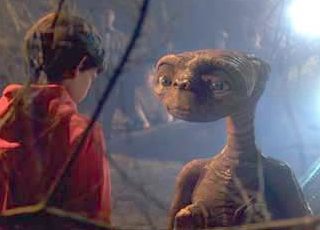
Family
-
Daughter: Destry Allyn Spielberg. born on Dec. 1, 1996;
mother, Kate Capshaw
-
Daughter: Mikaela George Spielberg. born on Feb. 28, 1996;
adopted with Capshaw
-
Daughter: Sasha Spielberg. born in June 1990; mother, Kate
Capshaw
-
Father: Arnold Spielberg. lost relatives in the Holocaust;
involved in the early development of computers; born c.
1918; divorced from Spielberg's mother; remarried on April
6, 1997
-
Grandmother: taught English to European Jews who survived
the Holocaust
-
Mother: Leah Adler. had four children with Arnold (Steven
the youngest); married to second husband, Bernie Adler; they
own a kosher dairy restaurant called The Milky Way on Pico
Boulevard in Los Angeles
-
Sister: Anne Spielberg. born on December 25, 1949;
co-wrote and co-produced "Big" (1988)
-
Sister: Nancy Spielberg. born in 1956
-
Sister: Sue Spielberg. born in 1953
-
Son: Max Spielberg. born in June 1985; mother, Amy Irving;
Spielberg and Irving share custody
-
Son: Sawyer Spielberg. born on March 10, 1992; mother,
Kate Capshaw
-
Son: Theo Spielberg. born c. 1988; African-American;
adopted by Capshaw before her marriage to Spielberg; adopted
by Spielberg
-
Step-daughter: Jessica Capshaw. born in 1976; Kate
Capshaw's daughter by a previous marriage
-
Step-father: Bernie Adler. married to Spielberg's mother
-
Step-mother: Bernice Colner. married Arnold Spielberg on
April 6, 1997
Significant Others
-
Wife: Amy Irving. had on-again, off-again relationship
from the late 1970s; married on November 27, 1985 in Santa
Fe, New Mexico; divorced in 1989
-
Wife: Kate Capshaw. married on October 12, 1991 at
Spielberg's East Hampton, Long Island, New York estate;
converted from Episcopalianism to Judaism c. 1993 after more
than a year of study with an Orthodox rabbi
-
Companion: Holly Hunter. had relation ship c. 1989
-
Companion: Margot Kidder. had realtionship in the early
1970s
-
Companion: Sarah Miles. had relationship in the early
1970s; Miles reportedly became pregnant and chose to have an
abortion
Education
-
California State College, Long Beach, California, English,
BA, 1970
-
Saratoga High School
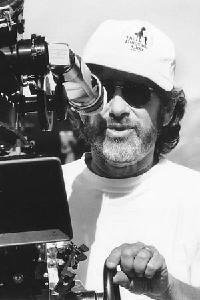
The director
Spielberg is the most
financially
successful motion picture director of all time. He has directed
and/or produced an astounding number of major box-office hits,
giving him enormous influence in Hollywood.
As of 2004,
he has been listed in Premiere
and other magazines
as the most "powerful" and influential figure in the
motion picture industry. In 2005, Empire
magazine created a list of the 50 greatest film directors of all
time. Spielberg was number one on the list.
Currently, he has won two
Academy
Awards for Best
Director, one for Schindler's
List and another for Saving
Private Ryan. He is seen as a figure who has the
influence, financial resources, and acceptance of Hollywood
studio authorities to make any movie he wants to make, be
it a mainstream action-adventure movie (Jurassic
Park) or a three-hour-long black
and white drama about the Holocaust historical subject
(Schindler's
List).
His beginnings
Spielberg was born in
Cincinnati,
Ohio but raised in the suburbs of Haddonfield,
New Jersey and Scottsdale,
Arizona. He is known by film historians as one of the famous
"film-school
generation" (also known as "the movie brats"
or "the New Hollywood") of the 1970s:
along with fellow filmmakers (and personal friends) George
Lucas, Francis
Ford Coppola, Martin Scorsese, John Milius, and Brian
De Palma, Spielberg grew up making movies. He was making
amateur 8mm
"adventure" movies with his friends as a teenager
(scenes from these amateur films have been included on the DVD
edition of Saving
Private Ryan), and he made his first short
film for theatrical release, Amblin', in 1968
at the age of twenty one. (Spielberg's own production company, Amblin
Entertainment, was named after this short
film.)
His maiden directorial work was a segment of the
pilot film to Rod
Serling's Night
Gallery. While working on this segment its star Joan
Crawford collared a production executive and said,
"Keep an eye on this kid, he's going places." After
directing episodes of various TV shows, including an early Columbo
TV movie, Spielberg directed his first well-known feature with a
1971
TV "movie-of-the-week" entitled Duel
(later released to theatres overseas and eventually in the
U.S.). This film, about a truck mysteriously terrorizing an
average citizen, has become a cult
classic, having been released on video several times over
the years. Much of his early success was due to Sidney
Sheinberg who is credited with discovering him; Spielberg
also received an honorary degree from Brown
University in 1999.
Move to theatrical films
Spielberg's debut theatrical feature film, The
Sugarland Express (takes place and filmed on location in Sugar
Land, Texas and is about a husband and wife attempting to
escape the law), won him critical praise and enough studio
backing to be chosen as the director of a summer movie that
would secure him a place in the history of motion pictures. Jaws,
a horror
film based on the Peter
Benchley novel about a killer shark that attacks people off
the coast of a small island. Jaws won three Academy
Awards (for editing, original score and sound), and grossed
over USD$100
million at the box office, setting the domestic record for box
office gross.
In
1976,
Spielberg was asked by Alexander
Salkind to direct Superman,
but decided instead to expand on a pet project he had had in
mind since his youth: a film about UFOs,
which became Close
Encounters of the Third Kind (1977).
The film remains a cult sci-fi classic among its fans.
The success Spielberg was beginning to enjoy, as well as his
eventual tendency to make films with wide mainstream and
commercial appeal, also subjected him to disdain in critical
circles by film reviewers. For example, Spielberg's next film
was 1941,
a big-budgeted World
War II comedy farce set in L.A.
days after the attack on Pearl
Harbor, with the two top stars from Saturday
Night Live, Dan
Aykroyd and John Belushi, along with other all-stars. Although the film did
make a small profit, it is considered by some to be Spielberg's
first flop, although today it is also considered a cult
classic. An expanded version has been shown on network
television and later on Laserdisc
and DVD.

Harrison
Ford as Indiana Jones in the Temple of Doom
The Bulk (1980-1999)
Indiana Jones
But what some would consider Spielberg's greatest film work
was still to come, beginning in the 1980s.
In 1981,
Spielberg teamed up for the first time with his friend George
Lucas to make Raiders
of the Lost Ark, his homage to the cliffhanger serials
of the Golden
Age of Hollywood, with Harrison
Ford (whom Lucas directed in Star
Wars) as the dashing hero Indiana
Jones. Raiders itself spawned two sequels, also
directed by Spielberg and executive produced by Lucas.
E.T. the Extra-Terrestrial
One year later, Spielberg returned to his alien visitors
motif with E.T.
the Extra-Terrestrial, a Disney-inspired
story of a boy and the alien whom he befriends (and is trying to
get back "home" to outer space). E.T. went on
to become the top-grossing film of all time for many years.
When E.T. was released, Spielberg, a
Porsche
928 aficionado, had his car's moon-roof button re-designed
with the movie's logo as both a gag for passengers, and a
tribute to the movie's success. Despite their enormous appeal,
few film scholars and critics place such Spielberg films as Raiders
or E.T. in the same class as The
Godfather, Citizen
Kane, or many other classics of the cinema.
E.T. originated as a sci-fi suspense thriller called Night
Skies. Night Skies also gave birth to Poltergeist,
a film that Spielberg co-wrote , co-produced (and some people
who worked on the film claim directed) and was released only a
week before E.T. Spielberg also negotiated an unusually lucrative
video
game licensing deal with Atari
for an E.T.
video game. This was a famously expensive failure which
contributed to the video
game crash of 1983.
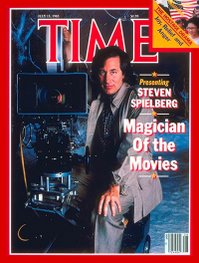
Spielberg
- TIME Magazine July 85
The Color Purple
In
1985,
Spielberg made The
Color Purple, an adaptation of Alice
Walker's Pulitzer
Prize-winning novel. Many critics were unsure of whether or
not Spielberg could handle such serious material, as his output
to that point had been viewed as "lighter"
entertainment. Indeed, this proved to be Spielberg's trial by
fire in presenting the story of a generation of oppressed
African-American women (Whoopi
Goldberg and Oprah
Winfrey) during depression-era America. Danny
Glover played the abusive patriarch. The film was widely
received and hailed by critics as Spielberg's successful foray
into the dramatic genre.
Empire of the Sun
1987 was a time when the Chinese economy was beginning to
boom, and as the Chinese gates began to open to the world,
Spielberg took advantage by shooting the first American movie in
Shanghai since the 1930s. The result was an adaptation of J.G.
Ballard's autobiographical novel, Empire
of the Sun, which told the story of a young boy named
Jim (Christian
Bale) who is separated from his parents during the sacking
of Shanghai in 1938, and is forced to survive through the rest
of the war. Spielberg wanted to convey a heartfelt message of
innocence being shattered as a result of war, as audiences saw
the transformation of Jim from sheltered [taipan]] to a
struggling and resourceful war refugee. The film garnered
numerous praise form critics, was nominated for several Oscars,
but did not attract the kind of box-office power that
Spielberg's films usually get.
Hook
Spielberg had tried numerous times to film a live-action
version of Peter
Pan without success. He eventually decided to create his
own take on the Pan legend in 1991.
Hook
focused on a middle-aged Pan (played by Robin
Williams), who returns to Neverland
to face the title character (Captain
Hook, played by Dustin
Hoffman). However, by the time the film began shooting,
innumerable rewrites and creative changes made by the numerous
major Hollywood players attached to project resulted in a film
regarded by most critics as hit-and-miss at best. The film was
made for $70 million (at that time a huge amount) and made $119
million domestically, but it was not as successful as some had
hoped.
In
1993,
Spielberg decided to once again tackle the adventure genre, as
he directed the movie version of Michael
Crichton's novel Jurassic
Park, about killer dinosaurs
rampaging through a tropical island resort.
The adaptation muted somewhat the novel's message about the
consequences of mankind tampering with nature, instead focusing
on the adventure aspects of the story. With the aid of
revolutionary special effects provided by friend George Lucas' Industrial
Light and Magic, the film became an instant classic. It
would eventually overtake E.T. as the all-time top
grossing film - a position it held for several years (until James
Cameron's Titanic).
Schindler's List
It was in that same year that Jurassic Park was
released that Spielberg finally received the critical acclaim he
had long sought for making Schindler's
List (based on the true story of Oskar
Schindler, a man who sacrificed himself to save 1,100 people
from the wrath of the
Holocaust). The screenplay, adapted from Thomas
Keneally's novel, was originally in the hands of fellow
director Martin Scorsese, but Spielberg negotiated with Scorsese to trade
scripts (at the time, Spielberg held the script for a remake of Cape
Fear). Schindler's
List earned Spielberg his first Academy
Award for Best
Director (it also won Best
Picture). While the film made a killing in the box-office,
Spielberg claimed not to have partaken in the profits, and
instead used the money to set up the Shoah Foundation. Critics
maintain that Schindler's
List is the most accurate portrayal of the Holocaust,
and in 1999 the AFI
listed it among the 10 Greatest Films ever Made.
The Lost World
After dabbling in projects such as The
Flintstones, Spielberg found himself back in the
director's chair in 1997, 4 years after Schindler's
List. This time, he was helming the sequel to 1993's
gigantic Jurassic
Park, Michael
Crichton's The
Lost World. The film was critically panned, but did
manage to generate nearly $230 million in domestic box-office,
giving it the third-highest total for 1997 behind Titanic
and Men
in Black.
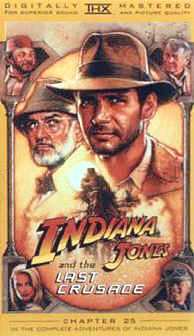
Indiana
Jones and the Last Crusade
Amistad
Spielberg, together with former Disney animation exec
Jeffrey
Katzenberg and media mogul David
Geffen, decided to form a new studio company called
Dreamworks SKG. Its first feature release was The
Peacemaker and Antz,
both of which did moderately well at the box-office. Spielberg's
first project with his new studio, Amistad,
was based on a true story about African slaves who rebelled
against their captors. The film received lavish praises from the
critics, but was noted for its violent massacre scenes. It did
not do well at the box-office however, and is considered one of
Spielberg's flops.
Saving Private Ryan
Another of Spielberg's critically acclaimed films, the World
War II drama Saving
Private Ryan, was released in 1998.
The film follows a platoon of soldiers led by Capt. Miller (Tom
Hanks), from the landing at Omaha Beach in Normandy to the
heart of French resistance, in order to retrieve a missing
private (Matt
Damon), whose brothers were lost to the war. Spielberg
considered it one of his finest works, yet in a highly
publicized "showdown", it lost the Best Picture Oscar
at the 1999
Academy Awards to Shakespeare
in Love. However, Spielberg would win his second Academy
Award for his direction in the war epic.
Later on, Spielberg and Hanks, overwhelmed with the greatness
of the film's subject, decided to team together to produce a TV
mini-series based on Stephen
Ambrose's historical novel, Band
of Brothers. The ten-part HBO
mini-series follows the trials and accomplishments of the 101st
Airborne, or Easy
Company, also starting from the landing in Normandy, to the
Battle of the Bulge, to the capture of Hitler's
Eagle's Nest in Germany itself. The series was hailed as the
greatest TV event of all time, winning a slew of awards both at
the Golden
Globes and the Emmys.
Into a new century (2000-2005)
A.I.
In
2001,
Spielberg filmed fellow director and friend Stanley
Kubrick's final project, A.I.:
Artificial Intelligence, a project planned by the two
directors for many years but which Kubrick was unable to begin
during his lifetime. The futuristic story of a humanoid android
longing for love, A.I. featured groundbreaking visual
effects, but unfortunately was not the blockbuster film
Spielberg had hoped for. It starred William
Hurt, Jude
Law, Frances
O'Connor, and child actor Haley
Joel Osment as the android boy David. The film polarized
both critics and audiences, many stating that the film was
overly long and a pretentious impression of Kubrick, while a
small minority of critics believed it to be a masterpiece. The
film failed to recoup its budget at the US box-office.
Minority Report and Catch Me If You Can
Following
A.I.,
Spielberg came upon the sci-fi short story written by Philip
K. Dick about the future of crime-fighting using
precognitive vision. In 2002, Spielberg and actor Tom
Cruise headlined Minority
Report, which features Cruise as a D.C. police captain
who has been foreseen to murder a man he has not even met. The
film was a futuristic homage to film
noir, with its intelligent premise, thrilling chase scenes,
and whodunnit structure. Shortly after the release of Minority
Report, Spielberg and Co. immediately went to work on Catch
Me If You Can, a story of the daring adventures of a
youthful con artist. The film stars Leonardo DiCaprio in the
lead role, with Saving
Private Ryan star Tom
Hanks as the FBI agent out to catch him. The movie marked a
turn of genre for Spielberg, who was at this point seen to be
branching out to different kinds of film genres aside from the
usual sci-fi fare he was known for. Both films did well in the
box-office.
War of the Worlds
A modernized adaptation of War
of the Worlds, featuring Tom
Cruise, was released in the U.S. on June
29, 2005.
As with past Spielberg films, Industrial
Light and Magic (ILM) provided the special effects.
In his films E.T. and Close Encounters of the Third
Kind, Spielberg portrayed alien visitors as potentially
friendly for human beings willing to connect with them. War
of the Worlds marked a departure from those optimistic
themes; more violent alien invaders visit havoc upon the earth.
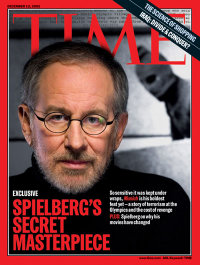
Spielberg
- Time Magazine Dec 05
Munich
On the same day as the release of War of the Worlds,
Spielberg began shooting Munich,
a film allegedly about the events following the 1972 Munich
Massacre. The film is based on Vengeance: The True Story
of an Israeli Counter-Terrorist Team, a book by Canadian
journalist George
Jonas, the first husband of Barbara Amiel, (now married to Conrad
Black).
The Jonas book, although promoted as non-fiction,
has been largely discredited by journalists. It was previously
adapted into the 1986 made-for-TV
movie Sword of Gideon. The screenplay for Munich was written by
Pulitzer
Prize-winning playwright Tony
Kushner. The movie is said to be an examination of the
murder of 11 Israeli athletes at the 1972 Munich
Olympics by the Black
September organization, followed by the event's aftermath in
which Israel's intelligence agency hunted down and killed the
perpetrators. The protagonist, Avner, is believed to be the
invention of Jonas' source, Yuval Aviv.
According to Jonas and Aviv, the Israeli team suffered
misgivings about their assignment, two were killed, and the
others were abandoned or treated badly by Mossad.
None of these claims have been verified by other sources.
Upcoming projects
Also in the works are an
Abraham
Lincoln bio-pic
starring Liam
Neeson as the 16th President
of the United States, and a 4th Indiana Jones film. Both are
scheduled for release in 2007.
He is also serving as the executive producer of Memoirs
of a Geisha, an adaptation of the best-selling novel by Arthur
Golden, a film he was previously attached to as director.
Spielberg is also an executive producer on the critically
acclaimed 2005 TV miniseries Into
the West. He is also co-executive producing the new Transformers
live action film with Brian Goldmer, an employee of Hasbro.
In October,
2005,
Spielberg announced that he had been signed by Electronic
Arts to direct three video
game projects.
Films by Steven Spielberg
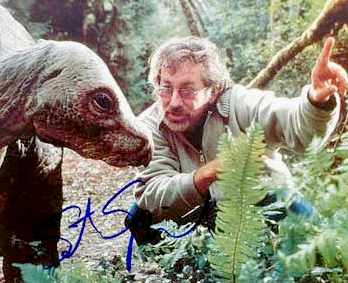
Salaries
-
Jurassic
Park III
(2001) $72,000,000
-
Schindler's
List
(1993)
$0 (Asked not to be paid)
-
Jurassic
Park
(1993) $250,000,000 (gross and profit
participations)
-
Raiders
of the Lost Ark (1981)
$10,500,000 + % of gross
Side projects
Spielberg has produced (without directing) a considerable
number of films, and can be credited with launching the career
of Robert Zemeckis. He is also a lover of animated cartoons,
and has produced several hit cartoons (and a few flops),
including Tiny
Toon Adventures, Animaniacs,
Pinky
and the Brain and Freakazoid.
He was also, for a short time, the executive producer of the
long-running medical drama ER
which currently airs on NBC.
In 1989 he brought the concept of
The
Dig to LucasArts.
He contributed with the project from that time to 1995 when the
game was released.
He is one of the co-founders of
DreamWorks
Pictures (DreamWorks SKG, with Jeffrey
Katzenberg and David
Geffen providing the other letters in the company name),
which has released all of his movies since Amistad in
1997.
Following the critical and box office success of Schindler's
List in 1993,
Spielberg founded and continues to finance the Shoah Project,
a non-profit
organization with the goal of providing an archive for the
filmed testimony of as many survivors of the
Holocaust as possible, so that their stories will not be
lost in the future.
He directed a few sequences and created some designs for
George
Lucas's Star
Wars Episode III: Revenge of the Sith.
Personal life
Spielberg has been married to actress
Kate
Capshaw, whom he met when he cast her in Indiana Jones
and the Temple Of Doom since 12
October 1991.
He has seven children—four biological: Max Spielberg (by
actress Amy
Irving, whom he married on 27
November 1985),
Sasha, Sawyer, and Destry (by Capshaw); two adopted (Theo and
Mikaela); and one stepdaughter (Jessica
Capshaw). Both Max and Sasha were born out of wedlock, but
Spielberg legitimated each child by marrying Irving and Capshaw.
Irving received a whopping US $100 million settlement from
Spielberg in their 1989 divorce. As an adult, Spielberg was diagnosed with
Asperger's
syndrome, explaining in part some of his social tendencies
and childhood obsessiveness about filmmaking.
Criticism
Perhaps the most prominent critic of Steven Spielberg is
American artist and actor Crispin
Glover. In a 2005 essay titled What Is It? Glover
says that Spielberg has “wafted his putrid stench upon our
culture, a culture he helped homogenize and propagandize.”
Among Glover’s accusations are that Spielberg purchased the
Rosebud sled used in Orson
Welles’ 1941
film Citizen
Kane for $50,000 but refused to hire Welles to write a
screenplay in the later years of his life, that he received
money from the United States government to promote his personal
religious and cultural beliefs, that his films do not take
risks, that he exploited tragedy for personal gain in the films Schindler’s
List and Saving Private Ryan, and that he, as a
co-owner of DreamWorks, considered building a studio on the last
remaining wetland
in Southern California.
Another prominent criticism by several movie-goers(both
professional and public) is that Spielberg's films lean towards
sentimentalism at the expense of the theme of the film. An
instance often cited by science fiction fans is the ending of A.I.:
Artificial Intelligence which they believed was too 'happy'.
This being a collaboration with Stanley
Kubrick whose films such as Dr.
Strangelove and A
Clockwork Orange are often tinged with pessimism drew a
heated debate as to whether or not Kubrick would have liked it
or not. However, both Kubrick's long-time assistant Jan Harlan
and the film's original story writer Ian Watson have said that
the ending is exactly what Kubrick intended. A related criticism
is that Spielberg's films lack depth and do not take risks, the
most prominent person with this viewpoint is anti-mainstream
film theorist Ray
Carney.
However this criticism is rejected by several knowledgable
film-makers and film critics who attribute it to either jealousy
of Spielberg's success or inability to look past his name.
Reknowned critic Roger
Ebert once stated that 'If only people could look past his
popularity they would see how talented he really is.' Some of
Spielberg's most famous fans include film legends Ingmar
Bergman and Francois Truffaut.
Spielberg's unabashed support for Israel
has also put him in the hot seat. In 2002,
a rumor circulated that Spielberg was planning a film about
Palestinian suffering during the Israeli/Palestinian feud. The
director's spokesman, Marvin Levy, called the report "an
obvious, vicious hoax." Spielberg is, however, currently in
production on Munich, a highly controversial project
which deals with the Israeli retaliation to the massacre of the
Israeli Olympic athletes during the 1972
Munich
Games. In order to deflect claims of bias, the filmmaker has
consulted various sources in creating the film.
Trivia
-
While the films that Steven Spielberg directed have won
numerous awards, no actor or actress has won an Academy
Award for a performance for one of his films.
-
Spielberg had a cameo role as the
Cook
County assessor in the last minutes of the 1980
film The
Blues Brothers.
-
In 1982
Ben
Kingsley won Best Actor and Richard
Attenborough won Best Director for the film Gandhi,
which beat Steven Spielberg's film E.T. for Best
Picture. Eleven years later, in 1993, Steven Spielberg cast
Richard Attenborough as John Hammond in Jurassic
Park (his first performance in 13 years) and Ben
Kingsley in Schindler's
List. Steven Spielberg won Best Director and Best
Picture Oscars that year.
-
Spielberg, an
Eagle
Scout, designed the requirements for the Boy Scout Cinematography
merit
badge.
-
While attending college, Spielberg was a member of
Theta
Chi Fraternity. Fraternity rumor states that many of his
films have very low-key symbols referring to the ritual of
the fraternity.
-
The
asteroid 25930
Spielberg is named in his honour.
-
Supports the
U.S.
Democratic Party.
-
Attended
Arcadia
High School in Scottsdale,
AZ and graduated from Saratoga
High School in Saratoga, California
in 1965.
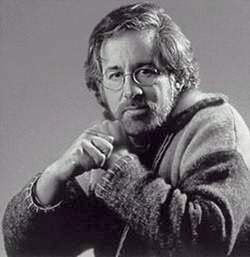
Steven
Spielberg - Director/Producer
-
In the
Warner
Bros. animated series Tiny
Toon Adventures and Animaniacs
(both of which were executive-produced by Spielberg),
Spielberg was a semi-recuring character. In some episodes,
Spielberg voiced himself, and in others, veteran voice-over
artist Frank
Welker did Spielberg's voice.
-
On attending Saratoga High School, he said that it was the
"worst experience" of his life and "hell
on Earth".
-
He first enrolled at California State University in Long
Beach in 1965, quit in 1969 to take a television director
contract at Universal Studios, and much later, as a
returning student, was awarded a B.A. in Film Production and
Electronic Arts with an option in Film/Video Production in
2002.
-
Attempted at admission to the
University
of Southern California's School of Cinema-Television
three separate times, and the prominent school later awarded
Spielberg an honorary degree in 1994.
Two years later, Spielberg became a Trustee of the
University and has since tirelessly devoted himself to
supporting USC.
-
The
A&E
Network is expected to announce that it will produce a
two-hour drama about the relationship between filmmakers George
Lucas and Steven Spielberg. According to Daily
Variety, the biopic,
tentatively titled Celluloid
Titans, is being executive
produced by Jody Brockway.
-
For his work on the Survivors of the Shoah Visual
History Foundation since 1994, he was awarded with the Great
Cross of Merit with Star, the German
version of the Great Officer's Cross, in September
1998 for "a very noticeable contribution to the issue
of the Holocaust".
-
Spielberg is expected to make a cameo appearance in an
episode of the second season of Extras,
the BBC comedy TV series written and directed by Ricky
Gervais and Stephen
Merchant (previously responsible for The
Office).
-
Steven Spielberg is recreated as a
LEGO
minifigure in the LEGO Studios series of sets.
-
His mother, the former Leah Adler, owns a
Kosher restaurant
in Los
Angeles, California.
-
In the 2005 edition of Forbes' "400 Richest People in
America", his net worth is estimated at $2.7 billion, a
$100 million improvement over 2004 (due mostly to his share
of the DreamWorks Animation public stock offering). He, and
good friend George Lucas (net worth: $3.5 billion) are the
only filmmakers on the list.
-
Every Spielberg-directed film since and including Jaws,
with the exception of The
Color Purple, has been scored by John
Williams. See also List
of noted film producer and composer collaborations.
Urban legends
Spielberg started a fanciful story of how he broke into
Hollywood
by sneakily squatting in an unoccupied office on the Universal
Studios lot. In fact, he had an unpaid summer job on the
lot.
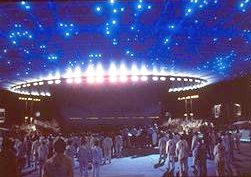
Close
Encounters of the Third Kind
Milestones
-
Directed Tom Cruise in "War of the
Worlds," which chronicles a Martian invasion of Earth (2004)
-
1960 Won first contest with 40-minute war film,
"Escape to Nowhere" at age 13
-
1962 Made first amateur 8mm feature film,
"Firelight" at age 16; father hired local theater
to screen film
-
1968 Professional debut with 24-minute short, "Amblin'"
(shown at Atlanta Film Festival)
-
1968 Signed to seven-year contract as TV director with
Universal-MCA
-
1969 TV directing debut with the "Eyes" episode
of the anthology series "Night Gallery"; segment
starred Joan Crawford
-
1971 First feature-length film for TV, "Duel"
(ABC)
-
1973 Wrote story for feature film, "Ace Eli and
Rodger of the Skies"
-
1974 Feature directorial debut, "The Sugarland
Express"
-
1975 Breakthrough feature film, the summer blockbuster
"Jaws"; also first collaboration with actor
Richard Dreyfuss; film brought in 100 days over schedule
(and comparably over budget); reportedly the first director
to do so
-
1977 Reteamed with Dreyfuss on the sci-fi classic
"Close Encounters of the Third Kind"; received
first Best Director Oscar nomination
-
1978 First feature as executive producer, Robert
Zemeckis's "I Wanna Hold Your Hand"
-
1979 Had rare flop with the large-scale comedy
"1941"
-
1980 Made a cameo appearance as the Cook County Clerk at
the end of John Landis's "The Blues Brothers"
-
1981 First collaboration with executive producer George
Lucas; first collaboration with actor Harrison Ford,
"Raiders of the Lost Ark"; garnnered second Best
Director Academy Award nomination
-
1982 First film as producer, "Poltergeist",
helmed by Tobe Hooper
-
1982 Helmed the blockbuster "E.T. the
Extra-Terrestrial"; also served as one of the
producers; became the top-grossing movie of all time pulling
in $399 million in its initial release; earned third Best
Director Oscar nomination as well as a Best Picture nod;
re-released on 20th anniversary in March 2002 with minor
changes and enhanced digital effects
-
1983 Helmed the "Kick the Can" segment of
"Twilight Zone - The Movie"
-
1984 Directed the sequel "Indiana Jones and the
Temple of Doom"
-
1984 Formed production company, Amblin Entertainment
-
1985 First TV series as executive producer, "Amazing
Stories" (NBC)
-
1985 Produced and directed "The Color Purple",
adapted from Alice Walker's novel; movie received 11 Academy
Award nominations including Best Picture, but not one for
Best Director
-
1986 Executive produced first animated feature, "An
American Tail"
-
1987 Made the underrated WWII drama "Empire of the
Sun", which featured a young Christian Bale in his
debut
-
1989 Directed the second sequel "Indiana Jones and
the Last Crusade"
-
1989 Served as a founding member and VP of the Artists
Rights Foundation
-
1989 Stumbled a bit with the romance "Always", a
remake of the 1943 feature "A Guy Named Joe";
third film with Richard Dreyfuss
-
1989 TV acting debut as himself in a segment of "The
Tracey Ullman Show" (Fox)
-
1991 Helmed the lavish "Peter Pan" update
"Hook" starring Robin Williams as a grown-up Peter
and Dustin Hoffman as the title character
-
1992 Signed a one-year deal to produce "seaQuest DSV"
a 22-episode series, a joint effort between Universal and
Amblin Entertainment
-
1992 With wife Kate Capshaw, co-hosted "Shattered
Lullabies", a documentary on high infant mortality
rates in the USA, broadcast on Lifetime as an episode of
"Your Family Matters"
-
1993 Co-produced and directed his most critically
acclaimed feature, "Schindler's List"; first
feature shot in black-and-white; won Best Director Oscar as
well as the Best Picture award
-
1993 Directed his most commercially successful feature,
"Jurassic Park"; film outgrossed "E.T."
to become the top movie of all time (to that date)
-
1994 Announced, along with mogul David Geffen and former
Disney executive Jeffrey Katzenberg, the formation of
DreamWorks SKG, a multimedia entertainment company for the
production of live-action and animated features, TV
programming, music and interactive software
-
1994 Formed the Survivors of the Shoah Visual History
Foundation to videotape the testimonies of Holocaust
survivors
-
1994 Invested in a CD-ROM company Knowledge Adventure;
participated in the creation of five titles
-
1995 Announced that DreamWorks SKG would grant their
filmmakers "moral rights" to protect the original
versions of their films after release
-
1996 "Champs", an ABC sitcom from executive
producer Gary David Goldberg, became the first DreamWorks TV
series (only lasted for a month)
-
1996 Received story credit on the premiere episode of
"High Incident", an ABC cop drama, the first
hour-long dramatic series from DreamWorks; reportedly was
highly involved with production, even personally choosing
each cast member, and operating a camera during portions of
the pilot
-
1997 "Amistad", a film based on a real-life
19th-century legal case involving slaves who staged a mutiny
on the ship carrying them to North America, was subject of
some controversy; author Barbara Chase-Riboud claimed that
the film's script was based in part on her book; subsequent
threats of lawsuits and articles tainted film's release
-
1997 Helmed the sequel "The Lost World: Jurassic
Park"
-
1998 Bounced back with the acclaimed WWII story
"Saving Private Ryan", starring Tom Hanks; earned
second Best Director Academy Award
-
2001 Returned to filmmaking with "A.I. Artificial
Intelligence", based on a story by the late Stanley
Kubrick; also wrote screenplay
-
2001 With Hanks, produced the HBO WWII miniseries
"Band of Brothers"
-
2002 Directed the sci-fi thriller "Minority
Report", starring Tom Cruise and Colin Farrell
-
2002 Executive produced the hit Sci-Fi Channel miniseries
"Taken"
-
2002 Reunited with Tom Hanks who co-starred as an FBI
agent pursuing the first teenager ever to make the Ten Most
Wanted list in "Catch Me If You Can", starring
Leonardo DiCaprio
-
2002 Served as a co-executive producer on Woody Allen's
"Hollywood Ending"
-
2002 Was an executive producer of "The Tuxedo",
starring Jackie Chan
-
2002 With the Survivors of the Shoah Visual History
Foundation, served as presenter of "Broken
Silence", a series of five documentaries about
Holocaust survivors; aired on Cinemax
-
2003 Received star of the Hollywood Walk of Fame (January
10, 2003)
-
2004 Again paired with Tom Hanks for "The
Terminal" also starred Catherine Zeta-Jones
-
2005 Executive produced "Into the West," (TNT) a
saga which spans 65 years of U.S. history from 1825 to 1890
-
Made first 8mm (3 1/2 min.) Film while in grade school;
set up a tree-planting business to pay for film and
equipment while in teens
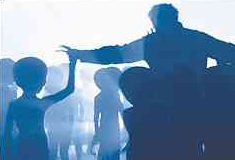
Richard
Dreyfuss - Close Encounter
LINKS:
A
- Z FILMS INDEX
A
- Z ACTORS INDEX
|















